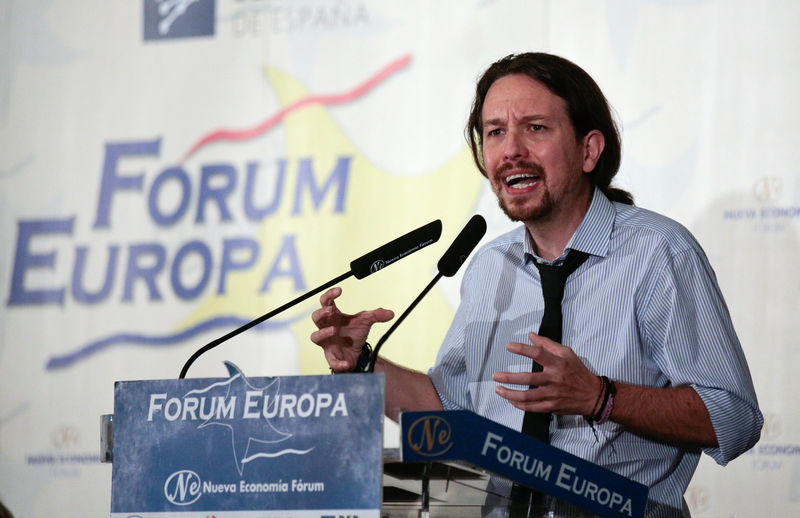By Julien Toyer
MADRID (Reuters) - A leftist alliance led by anti-austerity force Podemos will make big gains in Spain's national election on June 26, according to a closely-watched opinion poll on Thursday that cast new doubt over the complexion of the country's next government.
The survey, based on 17,600 interviews and deemed the most reliable to predict election results, showed the vote would be split between four main parties and four smaller ones, confirming a new era of political fragmentation and uncertainty in Spain after four decades of a stable two-party system.
In line with the previous election in December which failed to produce a government, the ruling conservative People's Party (PP) would again win most votes but remain far from a majority, forcing it to strike a 'grand coalition' deal with the Socialists and liberal Ciudadanos to remain in power.
A left-wing coalition agreement between the Unidos Podemos ("Together We Can") alliance and the Socialists would also fall short of a majority, though it could be made possible by the abstention of regional parties.
The survey, conducted on May 4-22, showed the Unidos Podemos alliance would grab 25.6 percent of the vote and 88 to 92 parliamentary seats in the 350-strong Spanish lower house, up from the 71 seats won by its members in December.
The PP would get 29.2 percent of the vote and 118 to 121 seats, down from 123 seats, while the Socialists would fall to third place with 21.2 percent and 78 to 80 seats compared to 90 seats previously. The liberal Ciudadanos would remain fourth with 14.6 percent and 38 to 39 seats, down from 40 seats.
Analysts say such an outcome would put the Socialists in a difficult position, at risk of suffering the same fate as the once powerful Greek centre-left Pasok party, which was eclipsed by the leftist Syriza party amid Greece's financial crisis.
If the Socialists backed a PP-led 'grand coalition', they would probably alienate left-wing voters who oppose austerity measures introduced by centre-right Prime Minister Mariano Rajoy in response to the financial crisis.
If they became a junior partner to Podemos in a leftist coalition government, they would stop being the dominant Spanish left-wing force and pave the way for a further rise of Podemos.
However, with slightly more than two weeks to go before the vote, one in six voters still undecided and about the same number planning to abstain, a surprise outcome remains possible.
The official campaign starts at midnight on Thursday.

Parties have said they will focus on a handful of constituencies where they hope to improve their results from December, especially in Spain's most rural areas.